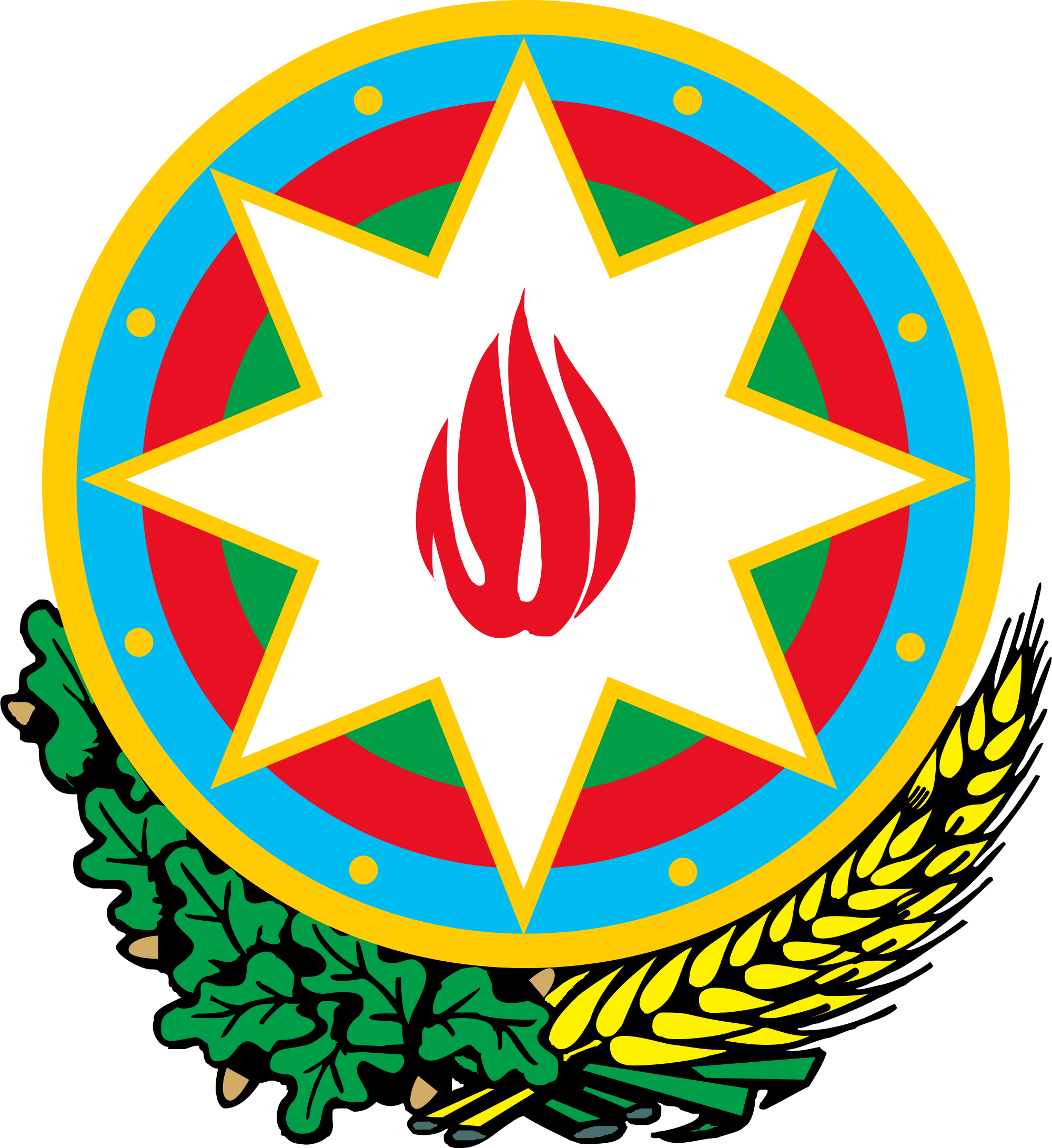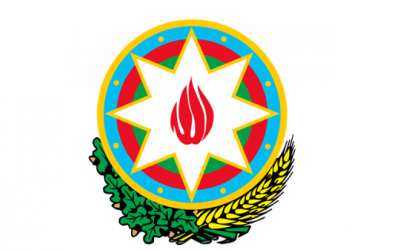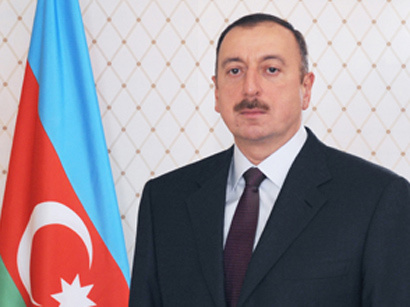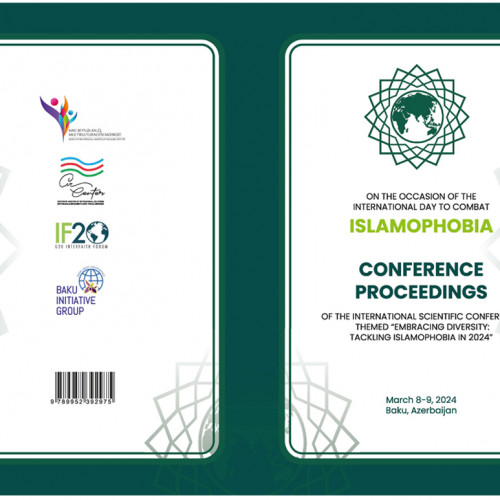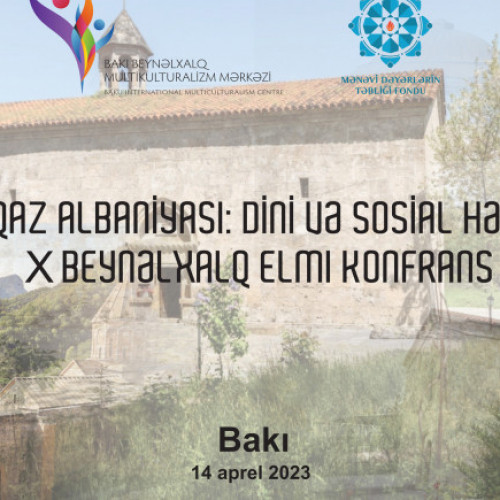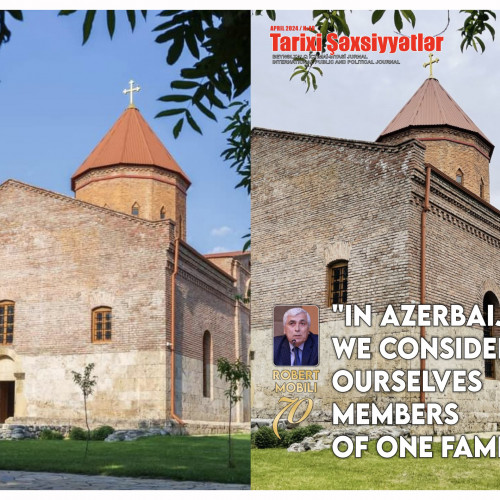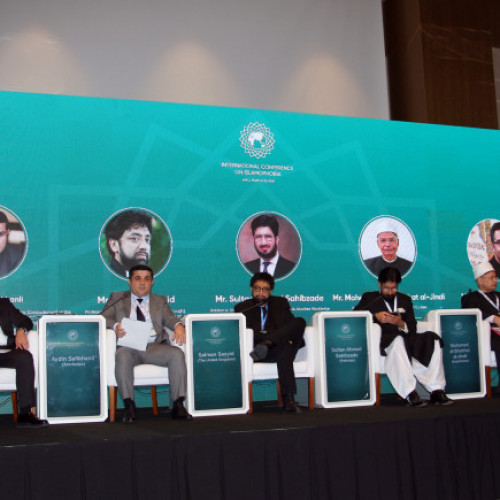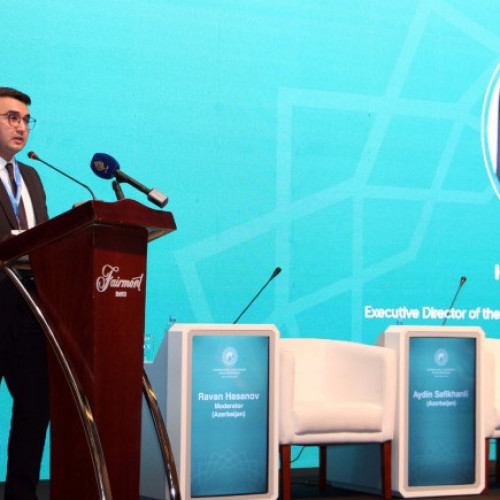About the measures implemented in the field of the protection of national minorities and development of their languages and cultures in the Republic of Azerbaijan
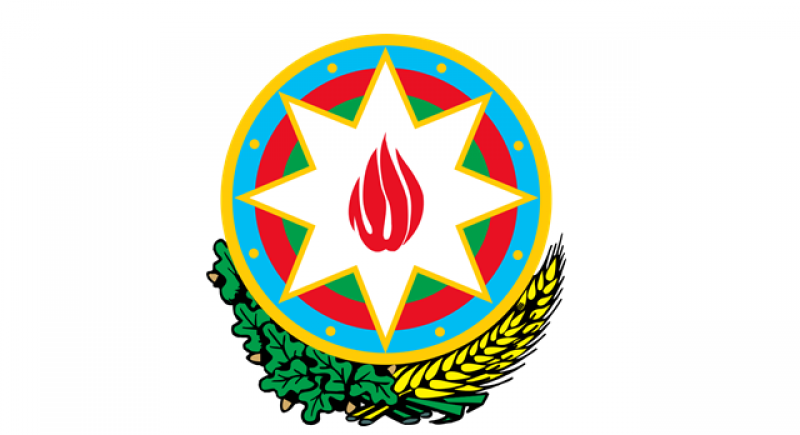
According to the 2009 census, 8.4 percent of the population of the Republic of Azerbaijan is composed of representatives of national minorities, minority peoples and ethnic groups.
Historically, Azerbaijan’s ethnic landscape has been diverse, and national minorities have never been subjected to discrimination or ethno-religious biases in Azerbaijan at any point in history regardless of their number.
The rights and freedoms of the national minorities living in the Republic of Azerbaijan are protected under the following articles (Article 21.2/State language, Article 25.3/Right to equality, Article 44.1 and 44.2/Right to national identity, Article 45.1 and 45.2/Right to use native language) of the national Constitution (adopted on November 12, 1995) and other regulatory legal acts.
According to Article 21 of the Constitution, the state guarantees the free use and development of other languages spoken by the population.
According to Article 25 (Right to equality) of the Constitution, the state guarantees the equality of rights and freedoms to everyone, regardless of race, ethnicity, religion, language, gender, origin, property status, occupation, beliefs or affiliation with political parties, trade union organizations or other public associations.
The above article also provides that restriction of rights and freedoms on the grounds of race, ethnicity, religion, language, gender, origin, beliefs or political or social affiliation is prohibited.
The right to national identity and language, one of the most essential principles for ensuring the protection of national minorities, is explicitly enshrined in the Constitution of Azerbaijan. Article 44 (Right to national identity) reads as follows: “Everyone has the right to preserve their national identity. No one can be forced to change their nationality.” Article 45 (Right to use native language) read as follows: “Everyone has the right to use their own language. Everyone has the right to be brought up and educated or engage in creative activities in any language of their choice. No one can be deprived of the right to use their native language.”
The government of Azerbaijan maintains functional cooperative relations with prestigious international organizations (UN, OSCE, Council of Europe, European Union, Organization of Islamic Cooperation, etc.) in the field of human rights, including protection of national minorities. Azerbaijan has acceded to a number of international instruments on human rights and protection of national minorities, including the European Convention for the Protection of Human Rights and Fundamental Freedoms, the International Convention on the Elimination of All Forms of Racial Discrimination, and the Council of Europe Framework Convention for the Protection of National Minorities by the Law of June 16, 2000.
The UNESCO Convention on the Protection and Promotion of the Diversity of Cultural Expressions came into force in Azerbaijan as of May 15, 2010 under the Law of November 26, 2009.
The government of Azerbaijan signed the European Charter for Regional and Minority Languages on December 21, 2001, but has not ratified it.
Protection and development of the cultural heritage of national minorities is one of the focus areas of the government included in the National Action Plan for the Protection of Human Rights adopted according to the relevant decree of the President of the Republic of Azerbaijan in 2006, as well as the National Program for Action to Raise Effectiveness of the Protection of Human Rights and Freedoms in the Republic of Azerbaijan approved by the President’s Order of December 27, 2011.
The decree on the “Protection of the rights and freedoms of national minorities, minority peoples and ethnic groups in the Republic of Azerbaijan and state assistance for the development of their languages and cultures”, the first of its kind in the post-Soviet space, was signed by the President of the Republic of Azerbaijan on September 16, 1992 and was successfully implemented.
Despite the numerous problems caused by the Armenian military aggression, one million internally displaced people, Armenian occupation of 20 percent of the country’s territories and difficult war circumstances, over the past period of independence, the state of Azerbaijan has maintained a consistent national policy and made significant progress in ensuring the rights and freedoms of national minorities.
All of the State Programs for socio-economic development of regions of the Republic of Azerbaijan in 2004-2008, 2009-2013, 2014-2018 and 2019-2023, approved by the relevant orders of the President of the Republic of Azerbaijan, specify the areas of government action for the subsequent periods for regions densely populated by national minorities as well.
Furthermore, the following Orders have been signed by the President: “Action Plan to accelerate the socio-economic development of regions of the Republic of Azerbaijan, including Lankaran city and Astara, Lerik, Masalli and Yardimli districts” (dated September 14, 2005), “On additional measures to accelerate the socio-economic development of Shaki city and Balakan, Gakh and Zagatala districts of the Republic of Azerbaijan” (dated June 1, 2006) and “On the approval of the action plan to accelerate the socio-economic development of regions of the Republic of Azerbaijan, including Guba, Gusar, Khachmaz, Siyazan and Davachi districts” (August 3, 2005). Under these Orders, large-scale projects have been implemented in socio-economic, educational, cultural, health, ecological and other spheres in the southern, north-western and northern regions densely populated by national minorities.
In the framework of these programs, hundreds of new schools, hospitals and diagnostic centers, sports and fitness complexes, tourist and recreational attractions, industrial and manufacturing enterprises, etc. have been built and put into use and large-scale development and restoration work has been carried out in regions densely populated by national minorities. At present, this process continues on a consistent basis.
Funding for the projects and programs envisaged comes from state budget, as well as state credit organizations and a number of international financial institutions. Since 2003, the National Entrepreneurship Support Fund under the Ministry of Economic Development alone has issued hundreds of millions of manats of soft loans to local businesses in Lankaran, Shaki-Zagatala, Guba-Khachmaz and Mountainous Shirvan economic regions densely populated by national minorities. The vast majority of these funds were used for various types of infrastructure projects and thousands of new jobs were opened in the regions. It should be noted that the above economic regions are home to a diverse range of national minorities (Lezgi people, Talysh people, Avars, Sakhurs, Russians, Georgians, Kurdi, Ahiska Turks, Udis, Jews, Tats, Lahij people, etc.) living in Azerbaijan.
National minorities are quite widely represented in the central government and executive structures and in the Parliament and law-enforcement system of the Republic of Azerbaijan. In state structures, representatives of national minorities hold various official positions such as the first or second highest ranking person, department heads, division managers, district governors and their deputies, etc. Besides, representatives of national minorities constitute an absolute majority in state structures and local self-government bodies of the regions densely populated by minorities.
Official statistics on the representation of minorities in state structures is not conducted, because according to the legislation of the Republic of Azerbaijan, identity cards of citizens do not indicate nationality.
At present, close to 50 NGOs, ethnic cultural centers, public associations and societies dealing with the issues of national minorities operate in the country.
In July 2007, the Council of State Support to NGOS under the President of the Republic of Azerbaijan was founded. NGOs operating in the country, including ethnocultural organizations of national minorities, have the opportunity to receive financial assistance by applying to the Council with the relevant grant projects.
The Radio Azerbaijan broadcasts regular government-funded radio programs in Kurdish, Lezgi, Talysh, Georgian, Russian and Armenian languages.
More than 15 newspapers and magazines are published in the languages of ethnic communities living in Azerbaijan, and 5 local television and radio stations operate in regions densely populated by national minorities.
Lezgi-language newspapers “Samur” and “Gusar” (the latter in Azerbaijani and Lezgi) and magazines “Chirag” and “Alam”, Talysh-language magazines “Tolyshi Sado”, “Tolyshon Sado”, “Dodo” and “Soz” (the last one in Azerbaijani and Talysh), Khinalug-language newspaper “Khinalug” (Guba), Georgian-language newspaper “Shalala” (Gakh district), and newspaper “Birlik” and magazine “Gudyal” of the Jewish community based in the Red Town (Guba district) are printed. Newspaper “Dange Kurd” is the organ of the “Ronai” Kurdish Cultural Center, newspapers “Vestnik” and “Oko” are organs of the Russian community of Azerbaijan, newspaper “Sodrujestvo” is the organ of the “Sodrujestvo” Society, newspaper “Akkord” is the organ of the public association “Support for Development of Azerbaijan-Bulgarian Friendship”, newspaper “Visnik” is the organ of the Ukrainian community of Azerbaijan, etc. The Baku and Azerbaijan Eparchy of the Russian Orthodox Church publishes a regular religious magazine in Russian.
More than 30 Russian-language newspapers and 15 magazines are published in the country, in addition to daily radio and television programs. Russian-language books on different subjects with a total circulation of up to one million are annually printed in printing houses across the country.
The book “Publications of national minorities living in Azerbaijan”, devoted to the study of press organs published in the languages of national minorities, was printed in Baku in 2010, and its presentation ceremony was held with the participation of ethnic cultural centers, NGOs, media representatives and intellectuals.
A Coordination Council, in which ethnocultural organizations of national minorities are represented, operate under Baku International Multiculturalism Center.
In addition to the Russian State Drama Theater named after Samad Vurgun in Baku and Russian troupes in a number of leading theaters of the country, there is State Drama Theater in Lankaran, Lezgi State Drama Theater in Gusar, Georgian State Theater in Gakh, as well as more than 40 musical and folklore groups of national minorities in Baku and several regions of Azerbaijan. Branches of the Union of Azerbaijani Writers have been established in regions densely populated by minorities such as Guba, Lankaran and Saki cities.
Teaching in general secondary schools of Azerbaijan is carried out in three languages, Azerbaijani, Russian and Georgian. In secondary schools (at primary grades) of regions densely populated by national minorities, native language classes are offered (in Avar, Kurdish, Lezgi, Talysh, Sakhur, Tat, Udi, Khinalug and Hebrew languages), and teaching aids and programs have been compiled in ethnic languages. Alphabets, curricula and other textbooks and student dictionaries are printed in Russian, Avar, Talysh, Kurdish, Lezgi, Sakhur, Tat, Udi, Khinalug and other languages with state funds, and this work continues on an ongoing basis.
There is a Council under the Ministry of Education which deals with the development and publication of teaching aids and programs in the languages of national minorities. Furthermore, a department named Methodology for Teaching Languages of National Minorities was established at the Research Institute of Pedagogical Sciences in 1999 to coordinate the activities related to the development and publication of curricula, textbooks, dictionaries, teaching and other materials in the languages of national minorities.
Currently, there are 16 secondary schools in Azerbaijan where teaching is in Russian only, 6 secondary schools with Georgian only instruction, and 345 mixed-language secondary schools (Azerbaijani-Russian, Azerbaijani-Georgian, and Azerbaijani-Russian-Georgian).
In 2003, a private Jewish secondary school teaching Hebrew and Jewish history and culture was opened in Baku, and Hebrew language classes were introduced at the Oriental Studies faculty of Baku State University. The Jewish educational complex Chabad Ohr Avner, built by the Heydar Aliyev Foundation and the Ohr Avner Foundation for Jewish children in Baku, was put into use in October 2010. Designed to teach the Jewish language, culture and history, this educational institution serves as an educational center for Jews living in the Caucasus and Caspian region as a whole.
Baku Slavic University with its rich scientific and pedagogical tradition operates in Baku, and all higher schools of the country have a Russian section. Attached to Baku Slavic University, there is also a Sunday School offering classes in the Ukrainian language and a society studying the languages and cultures of Caucasian peoples.
There are branches of higher education institutions and technical sciences/humanities-oriented colleges in Guba, Gusar, Zagatala, Shaki, Astara and other districts densely populated by national minorities, and a State University in Lankaran.
Through separate scientific research institutes, the Academy of National Sciences of Azerbaijan has published monographs and popular-scientific books on languages and cultures of national minorities, including historical, cultural and ethnographical heritage of Talysh people, Udis, Germans, Russians, Jews, Ingiloys, Tat people, Khinalug people and others. Poetry and prose collections, folklore examples and dictionaries in the languages of national minorities are regularly published and disseminated, and this work continues on an ongoing basis.
In 2011, a 558-page Orthographic Dictionary of Lezgi Language was published in Baku, along with a two-volume dictionary comprising over 34,000 words and phrases in the Mountain Jewish language (Juhuri-Russian and Russian-Juhuri), and a large Lezgi-Azerbaijani Dictionary and Talysh-Azerbaijani Dictionary were published in 2015.
The Public Television and Radio Broadcasting Company, as well as the nationwide television and radio channels and mass media outlets regularly present materials about the cultures, ethnographies, customs, traditions and lifestyles of national minorities.
The President of the Republic of Azerbaijan traditionally addresses congratulatory letters on the occasion of national and religious holidays and ceremonies of minorities.
On November 15, 2013, the Orthodox Religious and Cultural Center of Baku and Azerbaijan Eparchy was inaugurated with the participation of Azerbaijani President Ilham Aliyev.
By Orders of the President of the Republic of Azerbaijan, Archbishop of Baku and Azerbaijan Eparchy Alexander Ishein has been awarded the Order of Friendship, and former head of the religious community of Mountain Jews of Baku Semyon Ikhiilov, chairman of the religious community of Mountain Jews of Guba Boris Simanduyev, chairman of the religious community of Mountain Jews of Baku Milikh Yevdayev and chairman of the Alban-Udi Christian religious community Robert Mobili have been awarded the Order of Glory for their effective activities in the social and spiritual life of the country.
In Baku and other cities and towns of the country, including the southern and northern regions densely populated by national minorities, a number of historical and religious monuments have been renovated or restored with state funds and donations from local donors, and new mosques, churches and synagogues have been built and opened.
At the initiative of Azerbaijani President Ilham Aliyev and by the relevant decision of the Cabinet of Ministers, financial assistance is made to the Caucasian Muslims Office and non-Muslim religious communities from the state budget since 2011.
The Church of the Myrrh-bearing Women, which was not used for its intended purpose during the Soviet period, was returned to the Russian Orthodox Church and was overhauled with the financial support of an Azerbaijani businessman.
A Roman Catholic church was built in central Baku and was officially inaugurated in March 2008. In May 2011, the “Agreement between the Republic of Azerbaijan and the Holy See on the legal status of the Catholic Church in the Republic of Azerbaijan” was signed.
The historical Lutheran church in Baku was renovated under the Order of the President of the Republic of Azerbaijan and opened in December 2010 with necessary facilities for prayers and religious ceremonies of the Lutheran religious community. German Lutheran churches in the regions (Shamkir and Goygol districts) have also been overhauled.
Through the initiative and support of the President of the Republic of Azerbaijan, two new synagogues were built for European and Mountain Jews in downtown Baku in 2002 and 2012 respectively. These synagogues differ for their architectural features and dimensions from other Jewish temples not only in Azerbaijan, but in the entire Caucasian region. In 2010, the Gilaki synagogue in the Red Town of Guba district opened its doors to believers after an overhaul. At present, there are a total six synagogues in the country, including two in the Red Town (two in Baku, two in Guba and two in Oghuz). The two synagogues located in Oghuz district have also been renovated in the past period.
In June 2011, the Georgian Orthodox temple St Nino’s Church located in Alibayli village of Gakh district was inaugurated after renovation, and the Chotari church in Nij settlement of Gabala district was renovated and put into use.
Every year, the national and religious holidays of ethnic minorities are marked in Azerbaijan with the financial and organizational support of the relevant state agencies, and numerous conferences and roundtables, presentation ceremonies, poetry and music events, concerts and folklore programs and other socio-cultural events are organized.
Baku has hosted scientific conferences organized by the Ministry of Culture and Tourism on the themes of “Cultural heritage of national minorities and modernity” (2006), “Preservation of the cultural heritage of national minorities” (2008) and “Ethnic culture in Azerbaijan in the age of globalization” (2011), in addition to discussion sessions related to the protection of national minorities and their socio-cultural rights. These events have been widely covered by the national media.
Since 2006, traditional music festivals dedicated to the art of national minorities are biennially organized by the Ministry of Culture and Tourism under the slogan of “Azerbaijan: homeland” with the support of the Heydar Aliyev Foundation. These festivals bring together more than 40 groups from Baku and about fifteen other districts of the country with a combined number of 800 performers representing almost all national minorities. The gala concerts are widely covered by the Public Television and the best performing groups are awarded honorary diplomas by the Ministry of Culture and Tourism.
As part of the above project, photo exhibitions showing the ethnography and lifestyle of national minorities have been displayed in the exhibition hall of the Museum Center in Baku, the presentation ceremony of the disc of “Songs of the peoples living in Azerbaijan” has been held, and the “Atlas of traditional music of Azerbaijan” and “Album dedicated to ethnic music of Azerbaijan” dealing with the musical culture of national minorities have been presented to the public.
The World Day for Cultural Diversity for Dialogue and Development and the World Interfaith Harmony Week declared by the UN General Assembly and the International Day for Tolerance declared by UNESCO are annually marked in Azerbaijan with a series of events.
Topics such as “Convention for the Protection of Human Rights and Fundamental Freedoms”, “Universal Declaration of Human Rights”, the Council of Europe’s “Framework Convention for the Protection of National Minorities” and “Convention on the Protection of the Rights of All Migrant Workers and Members of their Families” are widely covered in professional training sessions of the staff of internal affairs bodies.
In 2013, under the auspices of the Heydar Aliyev Foundation and through the initiative and organizational support of the State Committee for Work with Religious Organizations and other related agencies, photo exhibitions titled “Azerbaijan: a land of tolerance” of world-renowned photographer Reza Deghati was displayed in Baku, at the European Parliament (Brussels), in Bordeaux city of France, at the UN headquarters in New-York and at the Azerbaijan Cultural Center in Paris in the framework of the project “Azerbaijan: a land of tolerance”, and the presentation of the report “Non-Muslim minorities in Azerbaijan: from the past to secular Azerbaijan” prepared by the international Belgian NGO Human Rights Without Borders was held at the European Parliament.
In April 2014, a photo exhibition of world-renowned photographer Reza Deghati portraying the life of Muslim, Christian and Jewish communities, who have peacefully coexisted in Azerbaijani lands for centuries, was organized at the Jewish Museum and Tolerance Center in Moscow at the initiative of the Heydar Aliyev Foundation in the framework of the project “Azerbaijan: a land of tolerance.”
In recent years, Azerbaijan has hosted a number of prestigious international events.
As the follow-up on the Baku Process on Intercultural Dialogue, the World Forum for Intercultural Dialogue is organized in Baku since 2011 with the support of Azerbaijani President Mr. Ilham Aliyev.
As part of the forums, different discussions, conferences and roundtables are organized on inter-civilization and intercultural dialogue, ethnocultural diversity in the society, peace, interethnic relations, multiculturalism and other relevant topics.
On June 16-17, 2011, Baku hosted the Ninth International Conference of Ombudspersons on the theme of “Cultural rights of national minorities and migrants: legal aspects and implementation”. The event attracted a wide audience consisting of government and parliament officials, NGOs, ethnic cultural centers, famous representatives of minorities, experts and scholars.
Since 2011, Baku hosts a traditional International Humanitarian Forum. As part of the Forum, several roundtables and panel discussions are organized on the topics of “Multiculturalism: achievements and challenges”, “Multiculturalism and cultural self-consciousness” and “Multiculturalism and identity in the age of globalization”, the problems existing in the field of preserving ethnocultural diversity and tolerance in society are widely discussed, and practical exchanges of ideas are conducted on Azerbaijan’s successful experience in this field.
On May 29, 2013, the international presentation ceremony of the National Tolerance Center was held in Baku as part of the World Forum for Intercultural Dialogue. As a groundbreaking and unique project in the region and Islamic world, the National Tolerance Center plays a central role in the coordination of the activities of local and foreign specialists studying the history, culture, ethnoreligious landscape and multicultural traditions of Azerbaijan, as well as in the development of interfaith and intercultural dialogue and cooperation and the promotion of the Azerbaijani model of ethnoreligious tolerance.
On September 1-2, 2014, an exchange meeting of the Council of Europe on the religious dimension of intercultural dialogue was held in Baku on the topic of “Intercultural dialogue: interaction between culture and religion.”
On April 25-27, 2016, Baku hosted the 7th Global Forum of the United Nations Alliance of Civilizations. The forum held under the slogan “Living together in inclusive societies: a challenge and a goal” brought together heads of state and government of UN member states, foreign ministers, political leaders, partner agencies, representatives of international and regional organizations, private sector, art, media and academia, donor organizations and funds.
In accordance with the UNESCO Convention on the Protection and Promotion of the Diversity of Cultural Expressions and in the framework of the project “Cultural diversity is our cultural unity,” a series of seminars, roundtables and conferences on the topic of ethnocultural solidarity are organized in the regions of the country densely populated by national minorities and indigenous peoples, booklets and brochures describing the cultural diversity of the country are published, exhibitions, concerts, competitions and other similar events are held.
As part of the Year of Multiculturalism declared in Azerbaijan under the relevant order of the President of the Republic of Azerbaijan in 2016, a number of events were held in the country and abroad, including the first international festival titled “Let’s uphold multicultural values” held in Khachmaz district. In the framework of the festival, an art exhibition named “Azerbaijan: one of the addresses of multiculturalism in the world” consisting of the drawings of schoolchildren from more than ten districts across the country, a culinary exhibition displaying varieties of the cuisines of national minorities, and a large concert program named “Our homeland is Azerbaijan” consisting of folk music of national minorities were organized, and a scientific-practical conference named “There is no alternative to multiculturalism” was held.
On June 28-30, 2016, Baku hosted the 5th Republican Festival of National Minorities under the slogan “Azerbaijan: homeland”, as well as a gala concert at the Heydar Aliyev Palace with the participation of more than 30 musical and folklore groups of national minorities representing 14 regions of the country. In addition, as part of the event, a photo exhibition titled “In one family” representing the everyday and domestic life and ethnography of national minorities was held on June 30 at the Carpet Museum, a disc and a photo catalog titled “Examples of song and dance folklore of national minorities living in Azerbaijan” was presented in Azerbaijani, English, Russian, French and German languages, and a roundtable was organized on the topic “Azerbaijani model of multiculturalism”.
The state has introduced a program titled “Capitals of folk art for 2010-2014.” According to this Program, among regions densely populated by national minorities, Shabran was declared as “the capital of legends of Azerbaijan”, Lankaran as “the capital of folklore of Azerbaijan” and Ismayilli as “the capital of craftsmanship of Azerbaijan” for 2011. This created favorable conditions for the preservation and development of national culture, as well as ethnic and cultural identity, ethnographic characteristics, historical customs and traditions and folk art in the above regions.
In order to promote the tolerant environment and ethnocultural diversity that have historically existed in Azerbaijan, the relevant documents have been prepared and submitted to UNESCO for inclusion of Lahij, Nij and Red Town settlements inhabited by national minorities in the UNESCO Representative List of Intangible Cultural Heritage. The inclusion of these documents in the UNESCO List is an important step in terms of promoting and preserving the unique intangible cultural heritage of the national minorities living in these settlements. It should be specifically noted that the local population of Lahij (Lahij people) adhere to Islam, the Nij population (Udis) adhere to Christianity and the Red Town population (Jews) adhere to Judaism. The ethnic and religious differences of the local populations of the above settlements were taken into account in the documents presented to the UNESCO.
The Moral Values Promotion Fund was established under the State Committee for Work with Religious Organizations pursuant to the Order of the President of the Republic of Azerbaijan of October 10, 2017. The main objective of the Fund is to conduct religious education, to protect and develop moral values, to ensure state support for the implementation of social projects in the field of regulation of relations between state and religion, as well as to provide financial assistance to religious figures and needy citizens.
One of the remarkable facts in the ethnocultural life of the country is the establishment of Baku International Multiculturalism Center in accordance with the Decree of the President of the Republic of Azerbaijan of May 15, 2014.
Baku International Multiculturalism Center (BIMC) is an organization that, guided by the ideology of Azerbaijanism, works to ensure preservation of tolerance and cultural, religious and linguistic diversity, as well as to promote Azerbaijan around the world as the center of multiculturalism, and to explore and advance the existing multiculturalism models. Currently, regular meetings and discussions with socio-cultural organizations and representatives of national minorities are organized at BIMC. Through BIMC, it is envisaged to implement multifaceted programs and projects in the field of ethnocultural rights of national minorities living in the country.
At present, through BIMC, the subject of “Azerbaijani Multiculturalism” is taught at universities of 19 countries around the world, including Russia, Italy, Czech Republic, Bulgaria, Lithuania, Georgia, Belarus, Switzerland, Portugal, Ukraine, Germany, Poland, Indonesia, Turkey, etc.
As of the academic year 2019/2020, the “Introduction to Multiculturalism” is taught as a compulsory subject at the undergraduate level in all higher schools of Azerbaijan, while the “Azerbaijani Multiculturalism” is taught as an optional subject at the postgraduate level.
In 2015, the Kultura Plus internet television (www.kulturaplus.az) was launched with the aim to promote the state policy carried out in the field of multiculturalism in our country, to protect the languages, cultures and traditions of the linguistic and religious minorities in our country, to conduct educational work among the population, as well as to deliver the truths about Azerbaijan to the world in several foreign languages.
Published since 2016, the magazine “Multiculturalism” allocates ample space to materials about the languages, cultures and traditions of national minorities living in Azerbaijan, besides topical problems of multiculturalism in the modern world, and publishes examples of poetry and prose in minority languages.
Pursuant to the Order of the President of the Republic of Azerbaijan of February 9, 2018, the Azerbaijan Institute of Theology was established under the State Committee for Work with Religious Organizations.
In 2020, the Council of State Support to NGOs under the President of the Republic of Azerbaijan and Baku International Multiculturalism Center envisaged to conduct a joint grant competition covering various topics related to national minorities.
Main organizations of ethnic minorities in Azerbaijan
The following are the main organizations and ethnic cultural centers of national minorities operating in Azerbaijan:
“Ronai” Kurdish Cultural Center, “Samur” Lezgi National Center, Center for Learning Lezgi Mythology, Lezgi Youth Center, “Dagestan” Cultural Center, Ukrainian Community of Azerbaijan, “Sakhur” Cultural Center, Talysh Cultural Center, “Orain” Udi Cultural Center, Alban-Udi Christian religious community, Avar National Cultural Center, “Lahij” Charity Society, “Azeri” Tat Cultural Center, “Russian Community of Azerbaijan” Public Association, Cultural Center of the Slavs of Azerbaijan, “Sodrujestvo” Society, “Tugan tel” Tatar Cultural Society, Tatar Community of Azerbaijan, “Yashlek” Azerbaijan Tatar Youth Center, Georgian Community of Azerbaijan, “Vatan” Society of Ahiska Turks, “Ahiska” Cultural Center of Ahiska Turks, “Budug” Cultural Center, “Shahdag” Cultural Center, European Jews Religious Community, Azerbaijani Mountain Jews Religious Community, Georgian Jews Religious Community, Jewish agency “Sochnut”, Jewish Cultural Center, “Azerbaijan-Israel” Friendship Society, Jewish charities “Hesed-Hershon”, “Joint” and “Vaad-I-Hetzola”, “Eva” Women’s Society, “Alef” Jewish youth club, “Hillel” Cultural Center of Jewish Students, “Judaica” International Society, German National Cultural Society, “Khinalug” Cultural Center, Public Association “Support for Development of Azerbaijan-Bulgarian Friendship”, Polish Community of Azerbaijan, etc.

